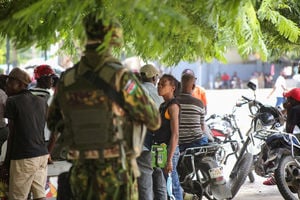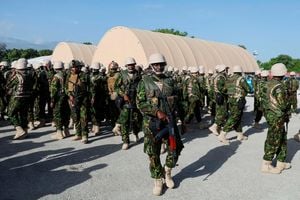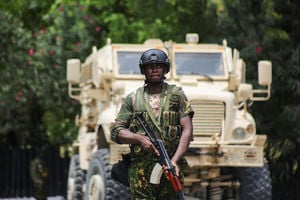
Kenyan police officers after their arrival in Port-au-Prince, Haiti June 25, 2024.
Kenyan police officers in Haiti are earning Sh295,000 monthly allowance on top of their usual salary, the Nation has learnt.
The revelation comes amid reports of growing disgruntlement over pay delays and equipment shortages that have affected the morale of policemen deployed in the Caribbean country.
A source, however, told the Nation that Kenyan police officers in Haiti have been paid their July allowance while August pay is still outstanding.
“We have received the one-month allowance and we have been informed that they will pay the other soon,” a source who sought anonymity as he is not authorised to address the media said.
Each member of the first contingent that deployed on June 25 has been paid the Sh295,000, while each officer in the second batch that went to Haiti on July 17 has been paid Sh94,000. Each police officer is to be paid $70 dollar per day, translating to $2,100 per month (Sh273,00), according to the agreement with the Kenyan government.
The officers, who are in the Caribbean nation for peace keeping under a Multinational Security Support Mission (MSS), have also secured additional military hardware to bolster the fight against armed gangs.
In July, United States Secretary of State Antony Blinken ordered the release of $109 million (Sh14.1 billion) to finance the United Nations-backed mission.
On August 26, Nation revealed that families of the Kenyan officers in Haiti had complained they were in financial distress as the policemen were yet to be paid the mission’s allowances.

Kenyan police offices stand at the airport after disembarking, in Port-au-Prince, Haiti June 25, 2024.
Acting Inspector-General of Police Gilbert Masengeli at the time assured the officers that they would receive the pay on time.
In Haiti, Mr Godfrey Otunge, the Mission’s commander, has asked the gang leaders to surrender buoyed by additional military hardware.
The Kenya police officers now have 34 Armored Personnel Carriers (APCs). When they deployed for the mission, they had only eight APCs donated by the US. But France has since supplied an additional 24 and the US added another two.
But one of the eight armored vehicles donated by the US developed mechanical problems following an attack by gangs in Gauthier town.
At the time of the ambush, the Kenyan contingent alongside the Haiti officers had battled the gangs that had taken over Road Two in Gauthier, which is the main route that leads to the neighbouring Dominican Republic.
Mr Otunge said that the focus is now in three towns within Haiti which include Delmas, Bel-Aie and Solino which are occupied by gangs.
“The operation will be done in collaboration with the Haiti National Police (HNP) in a bid to have these areas return to normalcy,” he said.
Apart from Kenya, other countries that will be sending troops to Haiti are Jamaica, Bahamas, Benin, Belize, Barbados, Antigua and Barbuda.
Others are Bangladesh, Algeria, France, Germany, Trinidad, Tobago, Turkey, the United Kingdom (UK) and Spain.
Mr Mr Masengeli last week in a statement thanked the US government for its support for the mission.
“We thank the US government for its continued support by heeding our call for additional equipment. MSS has received additional vehicles and equipment over the last one week, leading to more sustained joint operations between HNP and MSS personnel,” he said.
Mr Masengeli further said that the Kenyan officers “remain committed to their mandate and are professionally adhering to the International Human Rights Law as outlined under the Human Rights Due Diligence Policy.”
On June 21, a contract was signed at Washington DC in the US that spelt out the rights and immunities granted to the forces deployed for the Mission.
The deal stated the officers are not subject to inspection on arrival and exemption from taxes on both their incomes and emoluments. The equipment the troops use is also exempted from tax required in Haiti as long as they are for official use.
If any officer commits any crime within Haiti, they can’t be prosecuted in the Caribbean nation but are referred to the Mission without delay for the necessary course of action.
Any officer who serves as the MSS mission commander has the right to arrest members of his or her team for breaches of conduct and discipline in terms of policies and directives.










